Some things go bump in the night ... and these 'things' bump back
A few years ago, back when I was an undergrad, I took a course on fantasy that so influenced me that I wished I could major in it. I have kept all, or nearly all, of the texts and supplementary materials. This book is one of them, and one that I've been meaning to get to for a long time. In fact, since the class ended, this is the first time I've re-read it from cover to cover.
This is a scary book, but not in an obvious way. David, the quiet and slightly off-kilter protagonist, has lost his mother and is struggling with his OCD, his father's new wife, and the advent of World War II. His only comfort is in books and stories, which say things that only he can hear. Upset with his stepmother Rose, a baby half-brother, and a war that is keeping his father away from the house, David is ready to do something risky, selfish, and adventurous. He is beckoned by a strange being, the Crooked Man, and enters a fantasy world in a desperate bid to search for his dead mother. What he encounters are unnatural beasts, wise leaders, a quest, and a vague promise that all will be as it once was. But with the Crooked Man dealing alternatively in threats and promises and David's guides harboring their own sad secrets, David must rely on an instinct he isn't yet aware of to get him through the end.
According to the author, John Connolly, this is a book meant for adult readers, which may be why an undercurrent of solemnity runs through the novel. But it also shows its complexity in other ways, mainly in its retellings of classic fairy tales in which the ending is never what one might expect. Great emphasis is put on gender-swapped roles, such as aggressive and antagonistic women in place of traditionally male characters. The perceived threat of Rose is never far from David's mind, and his physical struggles coincide with his emotional turmoil and isolation. There is also a very grown-up theme of sexual predators, which exist both in the real world and in this fantasy land. This ties in with the idea of loss, both inflicted and circumstantial. Connolly says a lot about how the stories we make and hear reflect on ourselves, and the intricacies of the tales David hears and experiences for himself demonstrate his maturing psyche and powers of reasoning.
Simply told and packed with story, Lost Things is a sober but enlightening journey. You might feel weighed down by the sobriety at times, but it's worth it because in my opinion this has one of the best endings of any book in this genre. It's a perfect example of why fantasy resonates with us: we may use it to escape, but it will reveal who we really are to ourselves in the process.
This is a scary book, but not in an obvious way. David, the quiet and slightly off-kilter protagonist, has lost his mother and is struggling with his OCD, his father's new wife, and the advent of World War II. His only comfort is in books and stories, which say things that only he can hear. Upset with his stepmother Rose, a baby half-brother, and a war that is keeping his father away from the house, David is ready to do something risky, selfish, and adventurous. He is beckoned by a strange being, the Crooked Man, and enters a fantasy world in a desperate bid to search for his dead mother. What he encounters are unnatural beasts, wise leaders, a quest, and a vague promise that all will be as it once was. But with the Crooked Man dealing alternatively in threats and promises and David's guides harboring their own sad secrets, David must rely on an instinct he isn't yet aware of to get him through the end.
According to the author, John Connolly, this is a book meant for adult readers, which may be why an undercurrent of solemnity runs through the novel. But it also shows its complexity in other ways, mainly in its retellings of classic fairy tales in which the ending is never what one might expect. Great emphasis is put on gender-swapped roles, such as aggressive and antagonistic women in place of traditionally male characters. The perceived threat of Rose is never far from David's mind, and his physical struggles coincide with his emotional turmoil and isolation. There is also a very grown-up theme of sexual predators, which exist both in the real world and in this fantasy land. This ties in with the idea of loss, both inflicted and circumstantial. Connolly says a lot about how the stories we make and hear reflect on ourselves, and the intricacies of the tales David hears and experiences for himself demonstrate his maturing psyche and powers of reasoning.
Simply told and packed with story, Lost Things is a sober but enlightening journey. You might feel weighed down by the sobriety at times, but it's worth it because in my opinion this has one of the best endings of any book in this genre. It's a perfect example of why fantasy resonates with us: we may use it to escape, but it will reveal who we really are to ourselves in the process.


Comments
Post a Comment